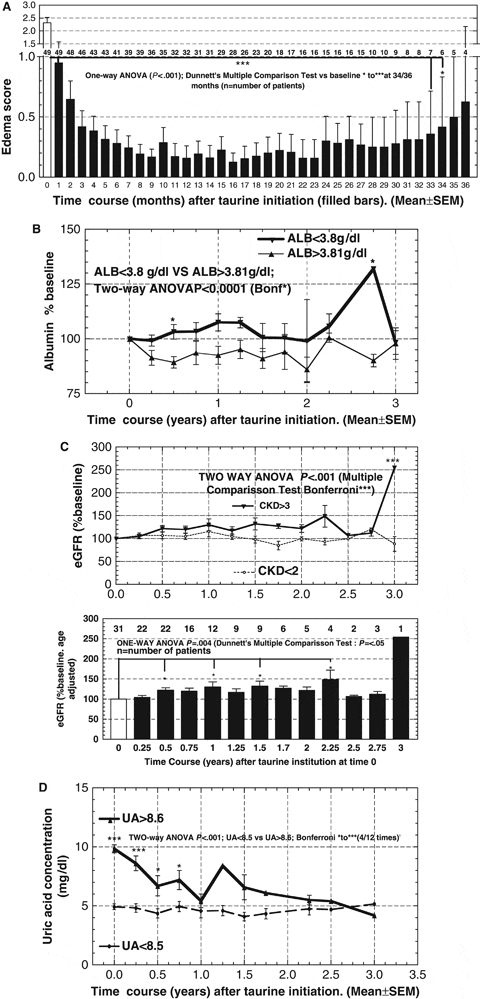foodandtheworld
Member
- Joined
- Apr 13, 2018
- Messages
- 239
TAURINE DIURETIC AND RENAL‐REVITALIZING EFFECTS IN NONAGENARIANS
Tadaomi A. Miyamoto MD, Tatsuko Fujita RN, Yoriko Wada MD, PhD, Masahide Nakai MD, Ayako Hazama MD
First published: 13 January 2011
Journal of the American Geriatrics Society -
Volume59, Issue1 January 2011 Pages 164-166
https://doi.org/10.1111/j.1532-5415.2010.03207.x
Error - Cookies Turned Off
"Long‐term oral taurine (OT 3 g/d) ameliorates CHF [congestive heart failure], so it was desired to determine whether OT (1.0 g three times per day) relieves edema without causing hypotension in nonagenarians. Forty‐nine residents of an extended‐care nursing home (20 taking antihypertensive therapy) who developed edema (score ≥2, Appendix A) despite hospital‐prescribed diuretics or excessive hypotension precluding effective diuretic usage were enrolled from March 1, 2007, to March 31, 2010."
"The remarkable effects of OT on edema were apparent within the first month of treatment (Figure 1A); decreases in body weight occurred with some delay. Required doses of diuretics decreased after institution of OT in the majority of residents."
"It is hypothesized that long‐term OT restored depleted IGF‐1, which changed prerenal creatinine production given its anabolic effects3 or, more likely, promoted renal regeneration and increase in functional renal units with greater creatinine excretion, decreasing creatinine levels and increasing eGFR effectively. Despite not having histopathological confirmation, these eGFR and uricosuric effects may make taurine the most promising nephroprotective medication."

"(A) Effects of taurine are strongest on edema, significantly decreasing body weight. (B) Taurine increases albumin levels in patients with <3.8 g/dL at baseline. (C) Effects of taurine on renal function: Lower panel: taurine significantly increases estimated glomerular filtration rate (eGFR) in patients with chronic kidney disease (CKD) Stage 3 or greater when normalized to baseline values by the sixth month of treatment, and continues to improve significantly for up to 2.25 years. Upper panel: greater improvement of eGFR in residents with CKD Stage 3 or greater compared that in those with CKD Stage 2 of less (two‐way analysis of variance P<.001) reaches significance after 3 years of treatment (Bonferroni***). (D) Taurine decreases hyperuricemia greater than 8.6 mg/dL to normal levels in 3 to 6 months."
--------
Thought this was an interesting article given a forum member's successful use of taurine in improving kidney labs:
Tadaomi A. Miyamoto MD, Tatsuko Fujita RN, Yoriko Wada MD, PhD, Masahide Nakai MD, Ayako Hazama MD
First published: 13 January 2011
Journal of the American Geriatrics Society -
Volume59, Issue1 January 2011 Pages 164-166
https://doi.org/10.1111/j.1532-5415.2010.03207.x
Error - Cookies Turned Off
"Long‐term oral taurine (OT 3 g/d) ameliorates CHF [congestive heart failure], so it was desired to determine whether OT (1.0 g three times per day) relieves edema without causing hypotension in nonagenarians. Forty‐nine residents of an extended‐care nursing home (20 taking antihypertensive therapy) who developed edema (score ≥2, Appendix A) despite hospital‐prescribed diuretics or excessive hypotension precluding effective diuretic usage were enrolled from March 1, 2007, to March 31, 2010."
"The remarkable effects of OT on edema were apparent within the first month of treatment (Figure 1A); decreases in body weight occurred with some delay. Required doses of diuretics decreased after institution of OT in the majority of residents."
"It is hypothesized that long‐term OT restored depleted IGF‐1, which changed prerenal creatinine production given its anabolic effects3 or, more likely, promoted renal regeneration and increase in functional renal units with greater creatinine excretion, decreasing creatinine levels and increasing eGFR effectively. Despite not having histopathological confirmation, these eGFR and uricosuric effects may make taurine the most promising nephroprotective medication."

"(A) Effects of taurine are strongest on edema, significantly decreasing body weight. (B) Taurine increases albumin levels in patients with <3.8 g/dL at baseline. (C) Effects of taurine on renal function: Lower panel: taurine significantly increases estimated glomerular filtration rate (eGFR) in patients with chronic kidney disease (CKD) Stage 3 or greater when normalized to baseline values by the sixth month of treatment, and continues to improve significantly for up to 2.25 years. Upper panel: greater improvement of eGFR in residents with CKD Stage 3 or greater compared that in those with CKD Stage 2 of less (two‐way analysis of variance P<.001) reaches significance after 3 years of treatment (Bonferroni***). (D) Taurine decreases hyperuricemia greater than 8.6 mg/dL to normal levels in 3 to 6 months."
--------
Thought this was an interesting article given a forum member's successful use of taurine in improving kidney labs:
"I had tried 5g of taurine for maybe 2 and half weeks or until I seemed to hit a saturation point. I knew when I hit it when my stools started getting a little sludgy from excess bile. That was when I stopped taurine or any Bvitamins. I waited almost 3 weeks and my lab results were still the best I've ever seen. Since then I've mainly just tweak to find a good balance and have added other aminos.
Creatinine at 1.03
GFR at 92"
Kidney Disease
Creatinine at 1.03
GFR at 92"
Kidney Disease

